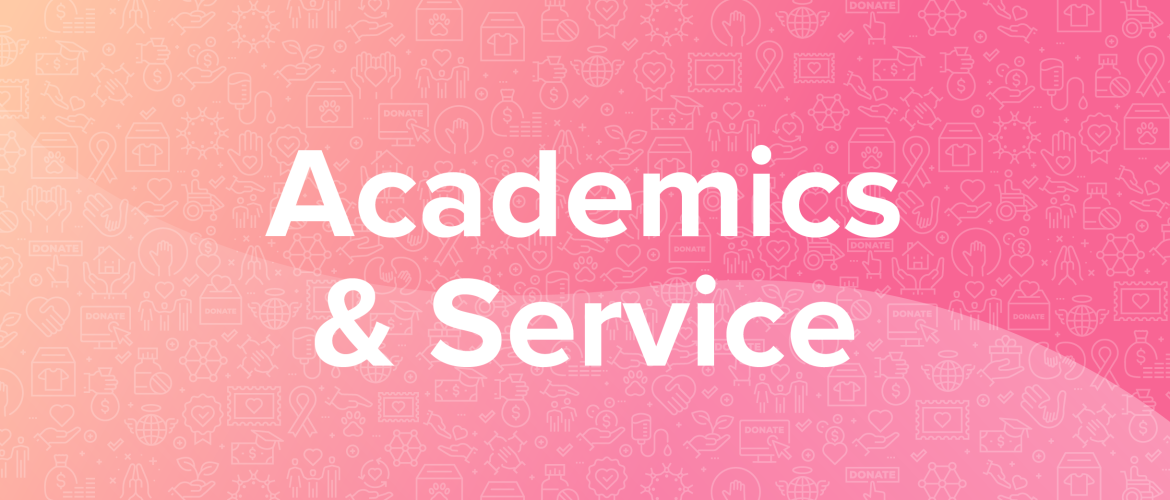Academics & Service
Center for Community Engagement
In collaboration with academic departments, the Center for Community Engagement (CCE) offers courses that promote citizenship, leadership, and social justice through community teaching and learning experiences. CCE administers the Community Engagement and Social Change minor, 195CE internship courses, Astin Scholars research program, and Changemakers Scholars youth empowerment program. It also oversees participation in AmeriCorps Jumpstart (early childhood literacy) and JusticeCorps (legal aid) programs.
Community Engaged Courses
Students can participate actively in the community through a variety of community-engaged courses offered through the center and UCLA departments. These course numbers use an XP suffix. Some courses include direct service (e.g., tutoring and mentoring), while others emphasize research as service (e.g., community-based research on the environment or public health). Students work about 20 hours off campus per term. Courses are credit bearing and often apply toward a student’s major or minor, including Community Engagement and Social Change. Courses may also fulfill other academic requirements.
Internship Courses
Internship courses help students apply academic knowledge and critical thinking skills to situations and challenges in the work environment. They encourage professional development and supply valuable insight for future career choices. Center-managed internship courses are numbered 195CE, and are open to students with junior and senior standing. Students work about 80-100 hours on internship activity per term. See center internship courses for application, requirements, and other details.
Community Engagement & Social Change Minor
Civic engagement includes an awareness of public issues and active participation in the community. Students apply what they have learned and generate new knowledge across disciplines through research and scholarship.
The interdisciplinary Community Engagement and Social Change minor offers students a core analytical, experiential, and theoretical framework for understanding issues of social inequality and community knowledge—and examining strategies for social change—through sustained community engagement. Student interests may include social justice and activism, food and the arts, social entrepreneurship, or government and public policy. The minor can be paired with any major. Details and application information are available on the minor web page.
Disability Studies Minor
Disability Studies shifts our perspective on a marginalized phenomenon at the center of our experience—disability—revising what is often misconceived as an aberration of daily life into one of its most basic and formative realities. This emerging interdisciplinary field uses disability as a lens for thinking about the body, society, and culture.
The Disability Studies minor is of interest to students from many different academic areas. Those interested in professions in teaching, social work, public health, nursing, medicine, architecture, and law may have a special interest in applying their study to focusing on the needs of disabled populations. Students interested in interdisciplinary academic work find rich avenues of new scholarship in fields throughout the arts, humanities, social sciences, and sciences. The breadth of participation by UCLA faculty demonstrates the richness of intellectual engagement possible for students in the minor.
Through a core course, carefully selected electives, a required two-quarter internship or research apprenticeship, and a senior capstone project or seminar, students in the minor obtain both breadth and depth in their understanding of the conceptual and practical implications of disability. For information about scholarships and how to apply to the minor, see the Undergraduate Education Initiatives website.
Quarter in Washington
While living in Washington DC, students research a project of their choice and complete an internship at one of Washington’s thousands of government agencies; think tanks; nonprofits; media outlets; and advocacy, trade, and business organizations.
The UCLA Center for American Politics and Public Policy (CAPPP) selects undergraduate students each fall, winter, and spring to participate in its Quarter in Washington Program. The program offers an exciting opportunity to combine UC courses with research and field experience. Students live at the UC Washington Center for up to 12 weeks, dividing their time between coursework and a part-time internship placement. They are registered as UCLA students and can earn UCLA credit in multiple majors (by petition) for all classes taken.
The core course, a research development seminar, is multiple-listed in political science, sociology, and history; meets the capstone requirement for the Public Affairs minor; applies toward the Civic Engagement minor; and is eligible for College Honors consideration. At least one course in a subject other than political science, such as economics or history, is usually offered each quarter.
All courses take advantage of Washington’s unique resources for study and research. Center administrators help students find a field placement that complements a substantial research project. Contact the CAPPP Office, 2133 Rolfe Hall, 310-206-3109 or send e-mail to info@cappp.ucla.edu; see the Quarter in Washington Program website for more details on how to apply.
UC Center Sacramento
The University of California Center Sacramento advances the University’s mission of teaching, research, and public service by offering an integrated program to train future state leaders to address challenging public policy issues confronting the nation and state.
UC Center Sacramento (UCCS) is located one block from the California State Capitol building. Operated by UC Davis, the center offers distinctive academic programs in public policy and journalism to students throughout the university’s 10-campus system.
The Policy program is offered every quarter and in the summer. Internship placements are tailored to a student’s background, experience, and career goals. Students gain first-hand knowledge of California’s public policy challenges and processes. The program includes coursework (up to 16 quarter units) and professional experience while living, interning, and attending classes in Sacramento.
The Journalism program is offered in the summer only. Students learn reporting skills working 24–40 hours per week as interns for media organizations that report on California government and politics.
For information about how to apply, housing arrangements, financial aid, and deadlines see the UCCS website.
